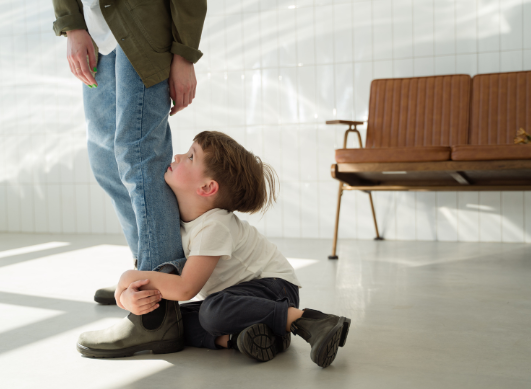- Home
- Share
- Forum
- General forums
- Living with anxiety and other mental illnesses
- Support for the Care Givers of those who have Mental Illness, Suicidal Thoughts or Attempts.
Support for the Care Givers of those who have Mental Illness, Suicidal Thoughts or Attempts.
- 9 views
- 0 support
- 1 comment
All comments

Unregistered member
09/09/2015 at 16:28
BOOK RECOMMENDATION
When Someone You Love Has a Mental Illness
A Hand Book for Family, Friends and Care Givers
Rebecca Woolis MFT
ISBN: 9780874776959
Give your opinion
Articles to discover...
Subscribe
You wish to be notified of new comments
Your subscription has been taken into account








Unregistered member
I am starting this discussion for those that are affected by the depression and mental health of a loved one, be that a wife, husband or partner, parent or child or carer. At times, we can feel very alone and overwhelmed and this might be a place to find some solace. While most of our energy goes into supporting the loved one, maybe through this we can help support each other too.
Mental Health issues are dreadful for the sufferer, but at times, we as carers find ourselves affected too. Please feel free to share your experiences, stories, trials and triumphs on here. Maybe by helping each other we can better help our loved one stricken with these soul destroying conditions.
In this first post, I want to recommend a course called Mental Health First Aid, that is probably the single one thing that offered me the most help and made the biggest difference to my ability to cope with the challenges of my husband’s mental health conditions.
What follows, is the story of how I came to go on this course and the difference it made to me……………………………………………...
My husband and I found each other late in life, when I was 53 and he was 56. As our relationship developed, he told me honestly and openly about his Depression, Anxiety and Borderline Personality Disorder. He made no secret of the fact that he had made numerous suicide attempts, going back to his late teens and early adulthood. I can honestly say I entered our relationship and later marriage, with my eyes wide open, or at least, I thought I did.
Not having any experience of mental health issues, I suppose at some level I believed that he attempted suicide because he was not happy with his life previously. I think I presumed that if I made him happy, if I looked after him and gave him the care and love he seemed to have lacked in his previous marriage and relationships, then it would not arise again. How wrong can a person be!!!
Being a great one for information, I made a point of reading extensively, of researching (I am an avid Googler) and of finding out what the books said I should do and not do when my husband was in a depressive state, or God forbid, a suicidal one. I was sure that if such a situation arose, I would be well equipped to handle it. For me, knowledge is a sort of defence, a weapon to wield. I must know facts, and I considered I had plenty of them in my arsenal.
We had been together about a year when we arrived at a situation where my husband took an overdose for the first time. My reaction was a huge shock to me, and not what I had foreseen in the least. Equipped as I thought I was to cope with this, to have all the right skills on hand for dealing with him, the after care, the questions to ask and not ask, one thing that had not occurred to me was how I would feel.
In the early stages after my husband’s overdose, practicalities took over, my efficient, capable persona came to the fore and I coped and ‘organised’. Organised getting him to hospital, visiting him in the short term acute unit, getting him home, arranging for Crisis Team visits and all the other things that go with the fall out of such an episode. There was so much to do and at the time, I was running my own business too, so was working into the early hours to do the things I wasn’t getting done in the day, then up again by 6a.m. to do as much as I could work and home wise, before the round of phone calls, visits etc started again.
As things settled down though, I went into something I can only describe as a sort of shock. The enormity of what had happened suddenly hit me. William had taken an overdose! He had tried to end his life, the life he shared with me. What was I doing wrong, was I a bad wife, didn’t I look after him well enough, didn’t I make him happy? The feeling of inadequacy, of failure, hit me like a physical blow! Next came the anger, how could he do this to me, how could he contemplate leaving me this way? Didn’t he know how devastated I would be?
As things returned to an even keel, this all subsided of course and we continued much as normal. I think I was a bit more jumpy if her were late home from anywhere, or if he went somewhere without telling me, but other than that, business as usual,
The suicide attempts happened about three more times before after a particularly upsetting episode, I rang the team that I was registered with for carer support. I had never called them before, it was usually them calling me to check all was well and do a quick telephone catch up. The lady I talked to was wonderful, she let me talk and share all my feelings of inadequacy. She then made a suggestion, which I still consider led to one of the best tools in my arsenal of coping strategies.
She had received details though the post of a course that was being run locally. It was called ‘Mental Health First Aid’. Its main purpose was to help health care workers whose main function was not in mental health, but who may come into contact with it, so people working in drug or alcohol services, people working with the elderly and many other services. This was the chance for them to get some recognised training to cope with any mental health issues they may encounter.
I was not a health worker, but the lady on the carer line thought that with my husband and step-son both having problems, I would benefit from the course. OK, sign me up! It was knowledge, and knowledge gives me strength and helps me cope. The carer association ran something called Life Long Learning, which gives each carer a fund to use for courses or other learning. You might need to learn to drive, to pursue a hobby for relaxation, join a gym and learn to exercise – this scheme offers a means of funding it. She applied for funding for me to do the course and was successful, I was in.
The course ran for two days a week for six weeks. I found it hard to fit that in around my own health issues, my caring duties and my business, but I was determined to do it. I actually only missed one session of the twelve, not bad going for such a topsy turvy lifestyle!
I have to say, it was the best eleven days I have ever invested in anything. I learned so much. I learned about the different mental health conditions, about how they felt to the sufferer, how it felt on the inside so to speak, how to ask the right questions and say the right things. It dealt with suicide, dementia, Schizophrenia, Depression, Personality Disorders and more.
Most of all, it taught me that this was NOT about me. I shared my feelings after the suicide attempt with the group, how I had felt inadequate, a failure, and basically, unloved. The tutor helped me see how there was nothing I could have done differently, nothing at which I had failed. This was about William. It was his journey and his inner demons that were causing it, nothing I had or had not done. Working harder, being more house proud, cooking better meals, nothing I could have done would have made a jot of difference. When he reached that space, disappeared into his black hole, to a degree I was irrelevant. I would not even feature in his agenda, so consumed would he be with his own thoughts. It would not occur to him he would be hurting me, that I would be left alone, that his children would be devastated. All he would be able to see would be his own desperation and a need for a way out.
In short, it taught me to take ‘me’ out of the equation and realise this was not about me and not to try and make it about me! What a revelation. What a weight lifted.
The next time William tried to end his life, I was able to be completely objective and much more effective because of it. True I still catnapped on the sofa with the house and car keys in my dressing gown pocket so he couldn’t disappear in the night while I was sleeping, true I kept the drugs under lock and key in the safe and stood over him while he took every tablet, true I had to tell him to dress, undress, shower, shave, eat, sleep, get up and all the rest but I didn’t have to deal with guilt at the same time. I still cried many a tear, but the tears were for him, not for me and that is a major difference! I wasn’t wasting energy and emotion beating myself up over something that was nothing to do with me.
If you are emotionally affected by the mental health of a loved one, with or without the suicidal aspect, I strongly recommend trying to access this course. I think some of the MIND branches offer it, or may well help you locate it. Mine was run locally by POIESIS, but I think there are others that deliver it too.
The next post will be some of the book titles that I have read that have been the most help.
Much love to you all, keep strong.
Suncatcher2015